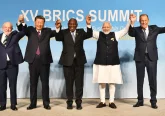When Boko Haram killed nearly 70 civilians over the Christmas holidays, many observers in the Western media were quick to chalk it up to wanton Islamic extremism. The attacks, it was concluded, reflected global jihadist activity. Emphasis was placed on the group’s links to al Qaeda.
This narrative is shortsighted. For one, it ignores Christian retaliation just days later, including the bombing of a madrasa that injured seven. More broadly, it decontextualizes the violence. Nearly 500 Nigerians were killed in the northeast in 2011 due to sectarian conflict. Suicide attacks, car bombings, and assassinations-by-machete have been documented throughout the country, Africa’s most populous and the linchpin of Western engagement with the continent. Such killings are not new to Nigeria: religious strife has been a constant for decades, with the Maitatsine clashes in the 1980s, riots in 1987 in Yola and Kaduna, open battles following Northern states’ move to Sharia in late 1999, and intermittent waves of Boko Haram attacks since 2009, among many other such episodes. With death rates hovering around 1,000 persons annually, Nigeria has arguably been trapped in a low-intensity civil war for thirty years.
This conflict, and the wider political division in which it is situated, is part of a continuing national discourse on the structure of the Nigerian state. Grasping the origins and importance of Boko Haram requires investigating this long-standing debate over Nigerian federalism.
A tale of two regions
Nigeria’s religious fractures are readily apparent at the level of its states. While the 13 northern states are predominantly Muslim, the southern 13 are majority Christian, particularly in the East. Between them is a buffer zone of 10 mixed states (and the Federal Capital Territory) known collectively as the Middle Belt. This reflects the regions’ divergent histories: while Islam spread from Sudan to northern Nigeria in the ninth century and was cemented as the dominant faith with the establishment of the Sokoto Caliphate in the early 1800s, Christianity arrived with European explorers in the 17th century and expanded with the colonial reach, from the southern coast northward. In 1914, these territories merged.
Lugardian indirect rule pushed ‘natives’ into administrative roles throughout the colony. Having benefited from missionary education, Christian converts were heavily favoured by the British, and by the 1950s it was apparent that Southerners dominated the indigenous bureaucracy.
As decolonization accelerated, the colonial government instituted a policy of ‘Northernisation’ to promote (mostly Muslim) administrators, legislators, and judges to leadership positions. The aim was to ‘re-balance’ the regional composition of the state. In 1954, the attempt to write an equitable constitution became a battle between the Northern Region and the southern (Eastern and Western) regions. While the former advocated a weak confederation that would insulate the North against southern administrative hegemony, the southern bloc fought for a strong federal government with checks against majoritarianism, allowing for control of the national bureaucracy without falling victim to the North’s larger population. In the end, a compromise was reached in which substantial power was devolved to regional authorities.
However, the agreement did little to dampen strong religious differences that sparked conflict over the following decades. Of particular contention was the role of Islamic law (Sharia). The British had classified it as ‘customary’ law, elevating common law to the ‘general’ code. They also bound Sharia to a repugnancy test whereby Islamic judicial decisions were overruled if found to violate ‘natural justice, equity and good conscience’. Additional procedural changes were introduced. Despite post-independence reform that attempted to roll back such impositions on Islamic jurisprudence, successive attempts at constitutional overhaul in 1979, 1989, 1995, and 1999 all failed to resolve the conflict over the nature and scope of Islamic law. Should it cover both civil and criminal cases? Should it be enforced for Muslims in Southern states? Should there be a federal Sharia Court of Appeal, and if so, should it have the power to interpret the Constitution? These and other matters were hotly contested throughout the post-independence period and remain so today.
It is against this backdrop that Boko Haram is intelligible. Many Northerners view themselves victims of oppression insofar as their rightful legal, moral, and religious apparatus has been denied them since colonial times. With a substantial majority – many states such as Zamfara, the first to attempt to enact Sharia in 1999, have populations that are well over 95% Muslim – and a theological obligation to submit to Islamic law, Northerners resent federal intrusion, which they say amounts to the abrogation of their constitutional right to religious freedom. The national government is thought to have consistently quashed Muslim aspirations through its southern dominance, from Lugard’s time to present day. It was this very arrogance, they claim, that led former President Obasanjo to declare statewide Sharia unconstitutional in early 2002 – and thus to the establishment of Boko Haram later that year.
Exit the subsidy
Last week, the global news cycle quickly pivoted from the Christmas attacks to President Goodluck Jonathan ending a long-standing fuel subsidy, sending fuel prices skyrocketing from 60 to 140 naira (£0.57) per litre. International media have aptly described the massive public outcry over this International Monetary Fund-backed policy shift. At present, with government corruption rife and the economy flagging, the subsidy was perhaps the only social service most people were able to access.
As with Boko Haram, however, the discussion decontextualises the risk this change presents to the federation. Distribution of oil revenues is a fraught issue. As the country’s petro-economy is entirely dependent on the (southern) Delta region, the government has struggled for decades to establish a permanent compromise on how much of its foreign export earnings should be kept by the federal government or handed to local authorities and what percentage should be returned to the states from which the oil was extracted. While the balance has been constantly changed, the subsidy represents a levelling force: every Nigerian theoretically accessed the oil revenues equally in the form of cheaper petrol. As such arrangements were continually challenged, the subsidy greased the wheels for political bargaining over revenue distribution. It was, in a sense, a facilitator of stability and compromise.
With this gone, Nigeria edges closer to the precipice. As the price of fuel doubles overnight, the real threat to the government is not populist resistance to inflation. More worrisome – and more likely – is a re-ignition of the debate over the proper role of the central government in state and regional affairs, organized around complex religious and cultural identities. Boko Haram and the elimination of the fuel subsidy are, quite simply, two challenges to Nigeria’s delicate structural balance. The fault line over federalism has inched wider.
Zach Warner holds an MPhil in Development Studies from the University of Cambridge. He is currently a research analyst at Bowdoin College, working with Professor Olufemi Vaughan on a project titled ‘Religion and State Formation in West Africa, 1800-2000’.
This post also appears on his website.








2 Comments